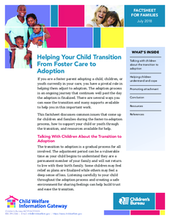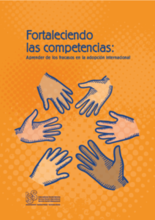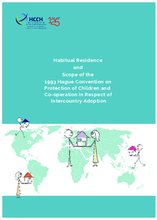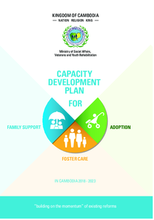Displaying 291 - 300 of 631
This volume is an effort to highlight best practices for children without parental care.
This article explores Intercountry Adoption (ICA) practices and the related expansion of orphanages (also referred to as residential care) in the East African context.
This short document provides a summary of initial learning from data gathered for an evaluation of the Why Not? initiative in Scotland. The Why Not? initiative within Care Visions services was started in 2014 to ‘improve the way young people are supported when ageing out of care, by offering a different experience of relationships beyond care.’
This factsheet for families offers tips for helping a child transition from foster care to adoption.
Esta nueva publicación del SSI sobre los fracasos de la adopción internacional tiene como objetivo acompañar y equipar a los profesionales de las Autoridades centrales y competentes y de los Organismos acreditados para la adopción, las personas adoptadas y los padres adoptivos, para prevenir mejor y manejar las crisis o los fracasos que las familias adoptivas pueden atravesar.
This Note from The Hague Conference on Private International Law aims to promote the proper interpretation and application of Article 2 of the Hague Convention of 29 May 1993 on Protection of Children and Co-operation in Respect of Intercountry Adoption (“1993 Hague Convention” or “Convention”).
This Plan presents key findings and 23 recommendations, sub-divided into short-term, medium-term and long-term actions, for an effective and efficient implementation of foster care, adoption and family support in Cambodia.
This information sheet outlines provincial adoption provisions for Indigenous children.
This study uses data from the recent Modern Adoptive Families survey to understand parent perspectives on their preparation for adoption.
This study uses data from the recent Modern Adoptive Families survey to understand parent perspectives on their preparation for adoption.







